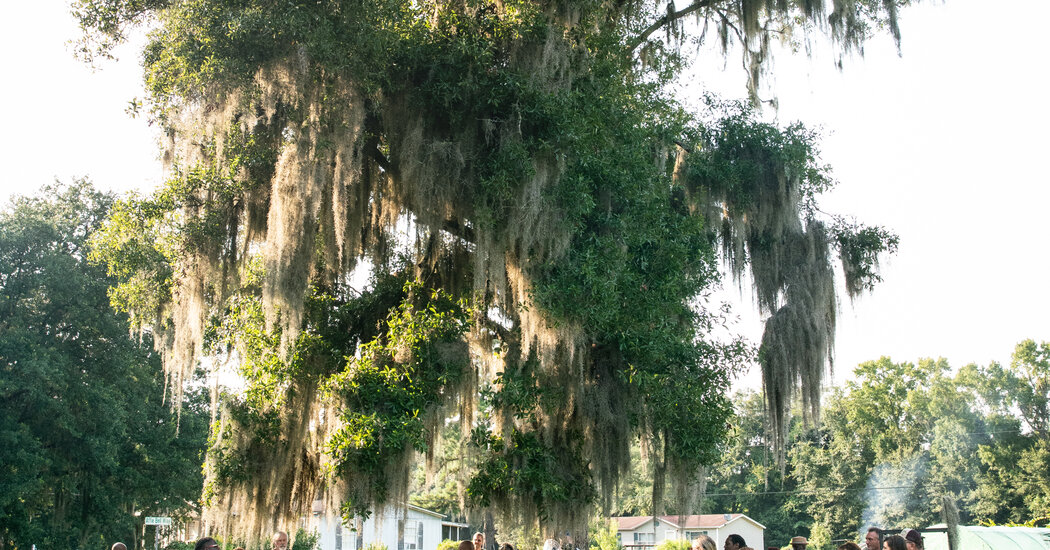
BRUNSWICK, Ga. — It’s not a stretch to say there may have never been a party for a cookbook like the one Matthew Raiford threw on his family farm a few weeks ago.
The book’s title is “Bress ‘n’ Nyam” — “bless and eat” in the English-based Creole spoken by the Gullah Geechee people who live along the coasts of the Carolinas, Georgia and northern Florida. Their ancestors were captured in West Africa and enslaved. Nowhere else in America has the cultural line from Africa been better preserved. (Mr. Raiford’s people call themselves freshwater Geechee, which means they are from the mainland of coastal Georgia. Saltwater Geechees are from the barrier islands.)
Mr. Raiford’s farm is on land that his great-great-great grandfather Jupiter Gilliard began buying after he was emancipated. Mr. Gillard eventually amassed 450 acres, land that Mr. Raiford believes had probably belonged to white plantation owners who either abandoned it or sold it cheap, fearing what would happen when they lost their power during Reconstruction. Over the years, the property was passed down, divided and sold. Only 42 acres remain, called Gilliard Farms.
When he was 18, Mr. Raiford left the farm and vowed he would never live there again. He married and had children. He joined the Army. Eventually, he graduated from the Culinary Institute of America, in Hyde Park, N.Y. Eleven years ago, at a family reunion, his grandmother handed the deed to Mr. Raiford and his sister, Althea, and told them they needed to get back to farming.
“I knew it would be hard coming back,” he writes in the cookbook. “Not just the farming, but also as a Black man in the South who cooks in a kitchen and works the land. That’s a lot of past to reckon with.”
For perspective, consider that the spot where Ahmaud Arbery was chased by two white men and shot to death as he jogged through a Brunswick neighborhood in 2020 is “all of 10 minutes from me,” Mr. Raiford said. “People are like, it’s a new New South,” he said. “I’m like, are the people who were there when I was a kid still there? Then it’s not a New South.” But it’s his home, and now he is dug in for good.
For the book party, Mr. Raiford and his new wife, Tia LaNise Raiford, invited an eclectic group of about 30 farmers, family and friends from around the Deep South to make connections and celebrate. The couple first met at culinary school, when both were in their 20s, then reconnected recently while working on a project for the EarthDance organic farm school in Ferguson, Mo. They married in May.
The two have merged their food and farming businesses into a company called Strong Roots 9, named for the $9 that Jupiter Gilliard paid in property taxes in 1870. It includes Zazou, an herbal tea company Mrs. Raiford started in Philadelphia, where she was living until she moved to the farm. She uses a lot of hibiscus, which grows well in Georgia, and has planted turmeric and ginger to harvest in the fall.
Throwing a good dinner party in this corner of Georgia in high summer is no small accomplishment. The temperature hit 96 degrees as guests began to arrive. Humidity hung in the air like a blanket. There were bugs the likes of which few book-party planners have ever seen.
But there were other pressing matters, like what was everyone going to eat?
Mr. Raiford describes Gullah Geechee cooking as an alchemy of “Native American fires, Spanish conquest, Caribbean inflection and West African ingenuity.” It’s also about whom you know.
The Raifords got lucky. Their friends at Anchored Shrimp Company in Brunswick had just pulled in some of the last of the season’s sweet, white Georgia shrimp. Mr. Raiford marinated them with rosemary from two big bushes he planted when he first came back to the farm. There were meaty rattlesnake watermelons from Calvin Waye (top, left), a family friend from down the road, and edible flowers and little cucumbers from the farmers’ market to pickle. The couple picked up several pounds of stone fruit from Georgia Peach World, a charmer of a produce stand along Interstate 95. Hibiscus for tea (bottom photo, below) came from their own farm.
Mr. Raiford assembled a grilling station out of cinder blocks and metro racks. Sweating it out at the grill for much of the day was the New York chef Ben Lee, who for a time ran the kitchen at A Voce Madison in Manhattan, and worked in Philadelphia for Marc Vetri, a chef Mrs. Raiford once worked for as well.
Mr. Lee (below right, in cap) had long been a student of Southern cooking, but met the Raifords in Philadelphia only recently. Mr. Raiford invited him to the party. He showed up and immediately got to work. ‘‘Matthew’s whole model is ‘get it done,’” Mr. Lee said, “and that’s what this farm personifies.”
Piles of fruit, spatchcocked chickens, eggplant and okra all got a turn over the flames. There was a big dish of Gullah red rice on the table, and for dessert, grilled peaches and plums covered in sweet teff pudding.
The chickens didn’t go on the grill until the guests arrived. The party stretched on for almost five hours. There was plenty of time for everyone to get to know one another. That’s just how Mr. Raiford wanted it.
“The book is about community,” he said. “It’s about paying it forward and figuring out what community looks like from here.”



